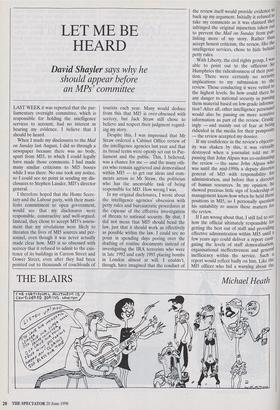LET ME BE HEARD
David Shayler says why he
should appear before an MPs' committee
LAST WEEK it was reported that the par- liamentary oversight committee, which is responsible for holding the intelligence services to account, had no interest in hearing my evidence. I believe that I should be heard.
When I made my disclosures to the Mail on Sunday last August, I did so through a newspaper because there was no body, apart from MI5, to which I could legally have made those comments. I had made many similar criticisms to MI5 bosses while I was there. No one took any notice, so I could see no point in sending my dis- closures to Stephen Lander, MI5's director general.
I therefore hoped that the Home Secre- tary and the Labour party, with their mani- festo commitment to open government, would see that my disclosures were responsible, constructive and well-argued. Instead, they chose to accept MI5's assess- ment that my revelations were likely to threaten the lives of MI5 sources and per- sonnel, even though it was never actually made clear how. MI5 is so obsessed with secrecy that it refused to admit to the exis- tence of its buildings in Curzon Street and Gower Street, even after they had been pointed out to thousands of coachloads of tourists each year. Many would deduce from this that MI5 is over-obsessed with secrecy, but Jack Straw still chose to believe and respect their judgment regard- ing my story.
Despite this, I was impressed that Mr Straw ordered a Cabinet Office review of the intelligence agencies last year and that its broad terms were openly set out to Par- liament and the public. This, I believed, was a chance for me — and the many oth- ers who remain aggrieved and demoralised within MI5 — to get our ideas and com- ments across to Mr Straw, the politician who has the unenviable task of being responsible for MI5. How wrong I was.
In my original disclosures, I wrote about the intelligence agencies' obsession with petty rules and bureaucratic procedures at the expense of the effective investigation of threats to national security. By that, I did not mean that MI5 should bend the law, just that it should work as effectively as possible within the law. I could sec no point in spending days poring over the drafting of routine documents instead of investigating the IRA terrorists who were in late 1992 and early 1993 placing bombs in London almost at will. I couldn't, though, have imagined that the conduct of the review itself would provide evidence to back up my argument. Initially it refused to take my comments as it was claimed they infringed the original injunction taken out to prevent the Mail on Sunday from pub- lishing more of my story. Rather than accept honest criticism, the review, like the intelligence services, chose to hide behind petty rules.
With Liberty, the civil rights group, I W8 able to point out to the officious Sir Humphries the ridiculousness of their posi- tion. There were certainly no security implications to my submission to the review. Those conducting it were vetted to the highest levels. So how could there be any danger to national security in passing them material based on low-grade informs.' Lion? After all, other intelligence personnel would also be passing on more sensitive information as part of the review. Grudg- ingly — and mainly out of fear at being ridiculed in the media for their pomposity — the review accepted my dossier. If my confidence in the review's objectiv- ity was shaken by this, it was virtual!Y destroyed when a journalist told me in passing that John Alpass was co-ordinating the review — the same John Alpass who was until the mid-1990s a deputy director general of MI5 with responsibility for administration, and before that a director of human resources. In my opinion, he showed precious little sign of leadership or management know-how when he held these positions in MI5, so I personally question his suitability to assess these matters for the review.
If I am wrong about that, I still fail to see how the official ultimately responsible for getting the best out of staff and providing effective administration within MIS until .a few years ago could deliver a report cast"' gating the levels of staff demoralisation, organisational ineffectiveness and general inefficiency within the service. Such a report would reflect badly on him. Like the MI5 officer who hid a warning about the Israeli embassy attack in another officer's cupboard because she had not dealt with it before the bomb went off, Mr Alpass might be tempted to downplay any find- ings of the review which supported my dis- closures.
If Mr Straw is not already convinced that the conflict of interest could affect the review, he should learn that, in addition to my original dossier on management mal- practice for this review, I prepared another document at the same time which concen- trated on operational inefficiency in MI5. It details, for example, how an IRA mem- ber was able to carry out large-scale attacks which threatened public safety and lives because an intelligence agency had not passed on relevant information quickly enough. It also details how the attack at Bishopsgate in the City in April 1993, which killed three people and caused a bil- lion pounds' worth of damage, shouldn't have happened. As this document discussed these and other sensitive operational matters, I did not want to send it to Mr Alpass by non- secure means. (I have never had any inter- est in compromising MI5's operational methods or security.) I suggested when I made my original submission that Mr Alpass might like to see this document as well. I'm still waiting for the review to take up my invitation. With the indication last week by the par- liamentary oversight committee that they do not intend to take my evidence — as it might encourage others to blow the whistle — came confirmation of what I had long suspected: the committee is too busy trying to impress the agencies to police them effectively. This was the first real test of whether that committee has the teeth to ensure that the intelligence services behave responsibly and effectively. They met Mr Lander but did not even take my evidence. Surely an oversight group should be there to ensure that criticism like mine is assessed and, when found to be accurate, acted upon. But the committee has quickly come to resemble the intelligence agencies themselves. It displays astonishing arro- gance in refusing even to consider con- structive and informed criticism. It adds to the cost of our bureaucratic intelligence set-up, but it doesn't actually add value to the taxpayers who fund it. In other words, it's jobs for the boys. I have said that I sometimes think that `MI Farce' is a more appropriate name than MI5 or 6. But there is nothing funny about failing to protect the lives of inno- cent citizens from terrorists, and now highly organised criminals, as effectively as possible. We are more likely to arrive at that goal through an honest exchange of views and informed debate.
This, I believe, scares Stephen Lander and many others in Britain's intelligence establishment. Even they must secretly sus- pect they are out of touch with the real world. Why else are they making such a fuss about receiving constructive criticism? If they really are confident that they are organised and efficient, why don't they declare an amnesty and let serving MI5 officers voice their concerns to the com- mittee? They have a system like this in the United States, where bureaucrats who have raised their concerns with their boss- es and been ignored can `whistleblow' to an independent body without their careers being affected. The public has no real love for Britain's arrogant and largely unaccountable, Oxbridge-dominated, self-styled intelli- gence elite — beyond its love affair with the mythical antics of James Bond. (I need hardly add that this has no place in any serious discussion of intelligence work.) So what is Mr Straw scared of? He has noth- ing to lose by dragging the services into the 1990s and everything to gain, not least that we will all be better protected and able to sleep that much more soundly in our beds. I have one last question for Mr Straw. MI5 had a file on him as a 'communist sympathiser'. Does he accept that his activ- ities at that time posed a threat to parlia- mentary democracy? If he does I suggest he admits this to Parliament — as a vote of confidence in MI5's ability to assess threats to the state — then resigns, as his position is clearly untenable. A good par- liamentarian should never be seen to have supported fifth columnists or agitators sub- versive of the democratic process.
But if he does not accept MI5's assess- ment of himself as an enemy of democra- cy, he must by deduction believe that the service unnecessarily infringed his civil lib- erties when it gathered information on his legitimate and democratic political activi- ties. If that is the case he has to ask him- self in how many other situations this happened and if he can trust an organisa- tion which abuses and wastes taxpayers' money in this way. It is a question that I believe he will find himself asking more and more, particularly when he has heard my evidence — in whatever form it might take.
David Shayler, a former employee of MI5, at present lives in western Europe.



























































 Previous page
Previous page